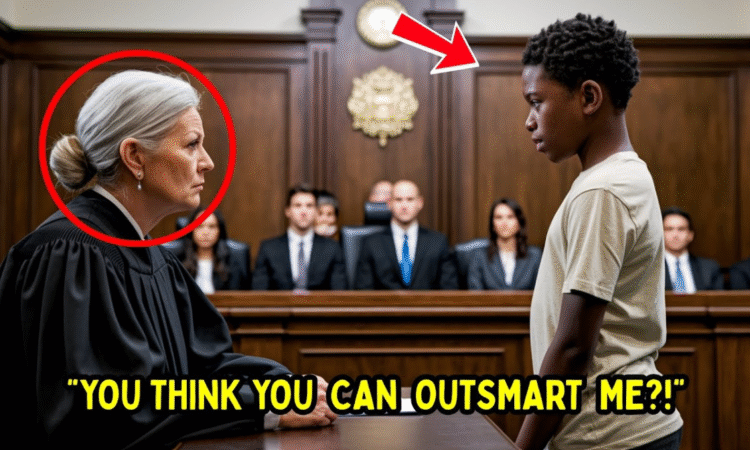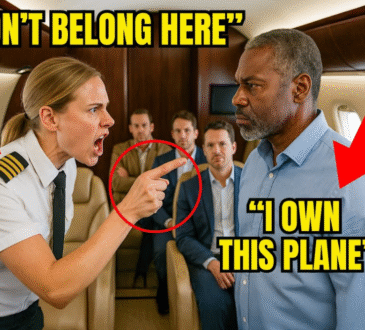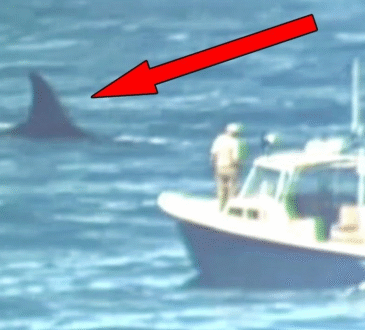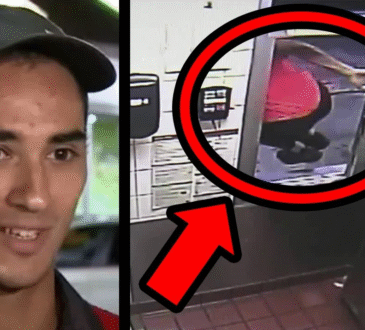
The courtroom was tense, the air thick with anticipation. The judge, a stern woman in her late fifties with a reputation for being unforgiving, peered down at the defendant over her glasses. Her lips curled into a faint smirk as she addressed him.
“Mr. David Miller,” she began, her voice dripping with condescension. “You’ve chosen to represent yourself in this case. Grand theft auto and resisting arrest are serious charges. Are you sure you don’t want a real attorney? This isn’t a game, young man.”
David, a scrawny 18-year-old, stood up. His hands trembled slightly as he adjusted his ill-fitting suit — a hand-me-down from his older brother. He looked like any other teenager caught up in trouble: nervous, out of place, and utterly unprepared.
The gallery of spectators chuckled softly, and even the prosecutor — a seasoned attorney in a sharp suit with a sharper tongue — couldn’t hide his amusement. But when David spoke, his voice was steady.
“Your Honor, I understand the gravity of the situation. I’ve reviewed the evidence, and I’m confident in my ability to defend myself.”
The judge raised an eyebrow, clearly unimpressed.
“Confidence is one thing, Mr. Miller. Competence is another. Let’s see how far your self-taught legal skills take you.”
The prosecutor, Mr. Grayson, stood up and smoothed his tie.
“Your Honor, the state is ready to present its case. We have overwhelming evidence against the defendant, including eyewitness testimony and video footage. This should be an open-and-shut case.”
David’s heart raced, but his face remained calm. He had spent weeks preparing for this moment, studying every detail of the case, every legal precedent, and every loophole. He wasn’t just fighting for his freedom — he was fighting to expose the flaws in a system that had already written him off.
As the prosecutor began his opening statement, David glanced at the jury — a mix of skeptical faces — then at the judge, who was already doodling on her notepad, clearly bored. They all thought this was a waste of time. They thought he was just another kid in over his head.
But David was about to prove them wrong.
Mr. Grayson called his first witness: Officer Daniels, the arresting officer. Daniels, a burly man with a no-nonsense attitude, took the stand and recounted the night of the arrest.
“Your Honor,” Daniels began, “on the night in question, I received a call about a stolen vehicle — a black sedan. When I arrived at the scene, I saw the defendant attempting to hotwire the car. I approached, identified myself as an officer, and ordered him to stop. Instead, he fled on foot. I chased him and apprehended him.”
David listened carefully, his eyes narrowing as he scribbled notes. When it was time to cross-examine, he stood with a calm, focused intensity.
“Officer Daniels,” David began, “you said you saw me attempting to hotwire the car. Can you describe exactly what you saw?”
Daniels hesitated. “I saw you leaning into the driver’s side window, holding what appeared to be a tool. You were fumbling with the wires.”
“And how far away were you when you observed this?”
“About 20 feet.”
David let that hang in the air. “Twenty feet. In the dark. And you’re certain you saw me holding a tool and fumbling with wires?”
Daniels shifted uncomfortably. “Yes.”
David turned to the judge. “Your Honor, may I approach the witness?”
The judge, now slightly more interested, nodded. “Proceed.”
David handed Daniels a photograph.
“Officer, this is a photo of the car in question. Can you point out where the wires are located?”
Daniels frowned, studying the photo. “They’re inside the dashboard.”
“Exactly,” David said, turning to the jury. “The wires are inside the dashboard — not visible from outside the car. So how could Officer Daniels have seen me ‘fumbling with wires’ through a closed window, from 20 feet away, in the dark?”
The courtroom buzzed with murmurs. The prosecutor objected.
“Your Honor, this is speculation! The officer’s testimony is based on his observations.”
David didn’t wait for the judge. “Your Honor, if the prosecution’s case relies on observations that are physically impossible, then their entire narrative falls apart.”
The judge leaned forward, her smirk gone, now curious. “Overruled. Continue, Mr. Miller.”
David turned back to Daniels. “You also said I fled when you approached. Did you clearly identify yourself as an officer before pursuing me?”
Daniels hesitated. “I… I believe I did.”
“You believe? Isn’t it standard procedure to identify yourself clearly before pursuing a suspect?”
“Yes, but—”
“Thank you, Officer. No further questions.”
As Daniels stepped down, the jury exchanged glances. Cracks were beginning to show in the prosecution’s case.
Next, the prosecutor called Mrs. Thompson, the car’s owner. She took the stand, visibly upset.
“Your Honor, I parked my car outside my house that night. When I woke up, it was gone. I reported it stolen. Later that day, the police found it with the defendant inside.”
David stood to cross-examine.
“Mrs. Thompson, did you see anyone take the car?”
“No. I was asleep.”
“And when police found it, was there any damage? Broken windows? Forced locks?”
“No. The car was intact.”
David turned to the jury. “So the car was ‘stolen’ without any signs of forced entry. How do you think the thief got in?”
“I… I don’t know. Maybe they had a key?”
“A key? Who else has access to your keys?”
“Just me and my husband.”
“Thank you. No further questions.”
David turned to the judge. “Your Honor, I’d like to call Mr. James Thompson, Mrs. Thompson’s husband.”
The prosecutor objected. “This is highly irregular!”
David calmly replied, “Your Honor, Mr. Thompson’s testimony is crucial. The prosecution had ample time to investigate.”
The judge nodded. “Overruled. Call your witness.”
Mr. Thompson took the stand.
“Mr. Thompson, do you own the black sedan?”
“Yes.”
“Did you lend it to anyone on the night in question?”
“I… I lent it to my nephew, Alex. He needed it for a date.”
The courtroom erupted in murmurs. Mrs. Thompson looked shocked.
David pressed on. “So your car wasn’t stolen. It was borrowed?”
“Yes.”
“And did you inform the police?”
“No… I didn’t think it was important.”
David turned to the jury. “So the car wasn’t stolen. Yet the prosecution is trying to convict me for grand theft auto. Their entire case is built on a false premise.”
The judge allowed him to continue.
David then called his final witness — Alex Thompson.
“Alex,” David asked, “did you borrow your uncle’s car that night?”
“Yeah. I needed it for a date.”
“And what happened after?”
“I parked it near my house. When I came back, it was gone.”
“Did you report it?”
“No. I didn’t want to get in trouble.”
David turned to the jury. “So the car was left unattended, and I found it. I wasn’t stealing it. I was trying to return it.”
The prosecutor objected, but David went on.
“Alex, did you see anyone near the car?”
“Yeah. There was a guy hanging around. He looked sketchy.”
“And did you tell the police?”
“No.”
David turned to the judge. “Your Honor, this proves the car wasn’t stolen, and raises serious doubts. As for resisting arrest, I’d like to explain.”
The judge allowed it.
“Your Honor,” David said, “Officer Daniels was in plain clothes. He didn’t identify himself or show a badge. I thought he was trying to rob me. That’s why I ran. I wasn’t resisting arrest. I was trying to protect myself.”
The courtroom was silent. The judge asked if there were any further witnesses.
“I’d like to testify,” David said.
He was sworn in and spoke directly to the jury.
“I never intended to break the law. I found an unattended car. When a stranger ran at me without ID, I ran. I was scared. But after being charged, I decided to defend myself. I studied the law and fought back, not just for me, but for anyone who’s ever been wrongly accused. I may not have a degree, but today, I proved that truth and preparation matter.”
The next morning, the jury delivered their verdict.
“On the charge of grand theft auto — not guilty. On the charge of resisting arrest — not guilty.”
The courtroom erupted. The judge banged her gavel.
“Order in the court!”
She turned to David.
“Mr. Miller, you’ve been acquitted. You are free to go. What you did today was remarkable. I hope you consider law — we need people like you.”
David smiled. “Thank you, Your Honor. I’ll think about it.”
Outside, the sun was shining. Reporters swarmed him. Alex approached.
“I’m sorry,” he said.
“It’s not your fault,” David replied. “The system failed us both. But maybe now, things will change.”
“So what’s next?”
David looked up at the sky. “Law school. If I could do this without a degree, imagine what I can do with one.”
He walked away, empowered. He had stood up to the system — and won. But more than that, he had proven something even more important:
This was just the beginning.




